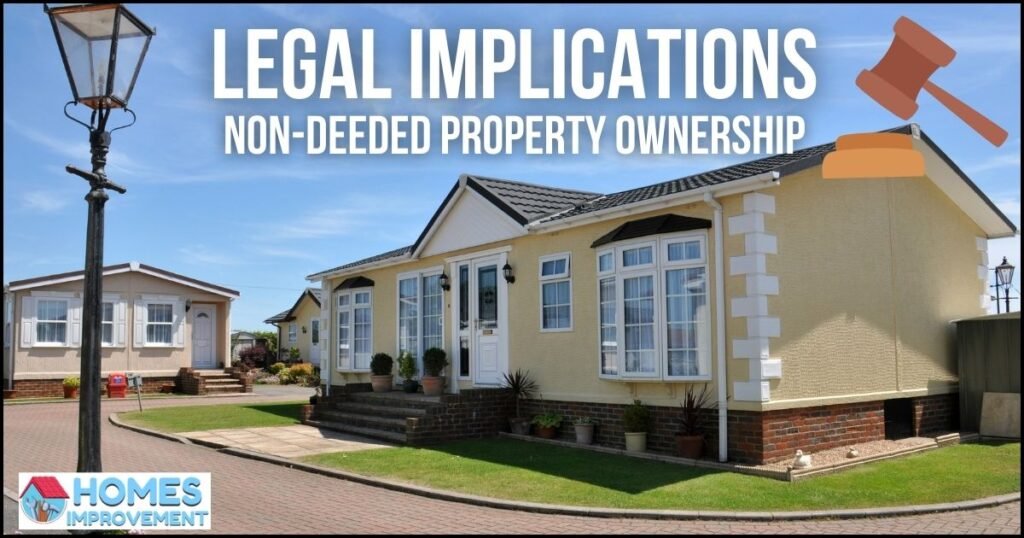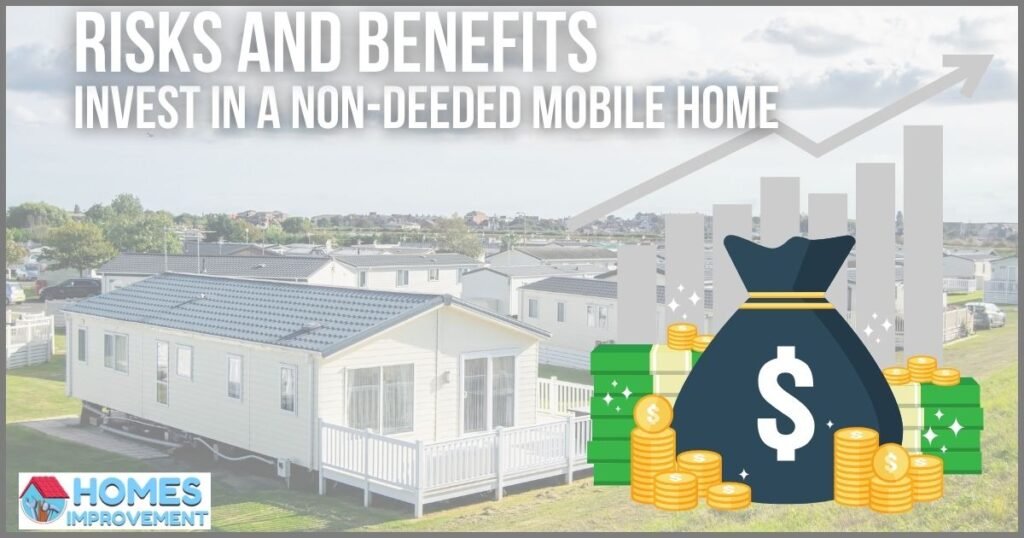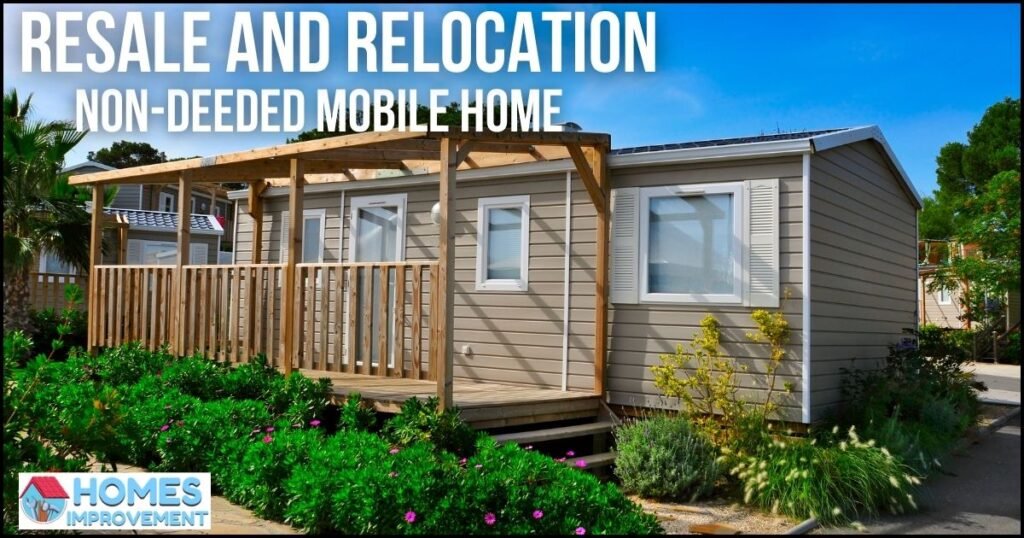What is a Non-Deeded Mobile Home?

A non-deeded mobile home is a type of mobile home that does not come with ownership of the land it is located on. Instead, the land is usually rented or leased by the owner.
The main difference between deeded and non-deeded properties lies in land ownership. With a deeded property, the homeowner has a legal title to the structure and the land.
In contrast, with a non-deeded property, the homeowner owns the structure but rents or leases the land where it sits.
In this post, we will learn about “Non-Deeded Mobile Home.”
Characteristics of Non-Deeded Mobile Homes
Ownership Specifics
When a mobile home is non-deeded, the property it is situated on is not owned by you, but you own the house itself. Instead, you will be responsible for paying rent or a fee for the land that your home is on. This differs from traditional homeownership, where you usually own the land and the building.
Typical Locations
Mobile homes not deeded are frequently found on leased land or in mobile home parks. Renting a lot for your house is possible in the community setting of mobile home parks. Playgrounds, community centers, and swimming pools are standard shared amenities in these parks.
Mobility Aspects and Regulations
Mobile houses’ portability is one of their main advantages, but it might seem more challenging than it might seem. A mobile home must be moved with specific tools and authorization. In addition, state and local laws differ, so before deciding to move, make sure you are aware of the current situation.
Legal Implications of Non-Deeded Property Ownership

If you possess a non-deeded mobile home, you do not own the customary deed that certifies the property title. There may be various legal ramifications from this.
For example, the alternatives for obtaining funding or loans may be more constrained without a deed. In addition, you could have to deal with limitations or ambiguities related to ownership issues, land usage, and property taxes.
Knowing your rights and obligations is crucial because they can change significantly based on local laws and regulations. Always think about speaking with a legal professional to handle these issues.
Financial Considerations
Financing Options for Non-Deeded Mobile Homes
A typical home’s financing may differ from a non-deeded mobile home. A non-deeded mobile home may be more challenging to get a mortgage because you must own the property below it.
Still, the following choices are available:
- Personal Loans: Banks and credit unions accept applications for personal loans. While they are easier to obtain for non-deeded residences, personal loans typically have higher interest rates than conventional mortgages.
- Manufactured Home Loans: Although not all manufactured homes are deeded, some lenders focus on providing loans for such properties. Given the particulars of mobile homes, these loans could have additional terms and restrictions.
- Chattel Mortgages: Loans for moveable property, including mobile homes, are called chattel mortgages. This kind of financing is like a car loan but doesn’t involve the land.
- Seller Financing: The mobile home’s seller may occasionally offer to finance the acquisition. This implies that you pay the merchant directly rather than through a bank.
- Government Programs: In some areas, government programs are available to assist with financing mobile homes. These could be programs that help with a down payment or low-interest loans.
Finding the best financing for your non-deeded mobile home can be facilitated by looking into these possibilities and corresponding with several lenders.
Risks and Benefits of Investing in a Non-Deeded Mobile Home

Risks
You should be aware of the following particular dangers when making an investment in a non-deeded mobile home:
- Depreciation: Mobile homes, like cars, can lose value over time, unlike traditional dwellings.
- Difficulties with Financing: Obtaining funding may entail more significant challenges and frequently result in increased interest rates.
- Land Lease Costs: The land on which your mobile home is situated is subject to a land lease, which may grow over time.
- Costs associated with Relocation: Relocating a mobile home can be costly and require specific tools and licenses.
- Restricted Legal safeguards: You might be more exposed to ownership issues because you might have fewer legal safeguards than typical homeowners.
Benefits
Purchasing a non-deeded mobile home has various advantages despite the dangers involved:
- Reduced Cost: A mobile home is typically less expensive than a standard house.
- Flexibility: Should circumstances warrant it, you are free to relocate.
- Many mobile home parks offer shared facilities, such as playgrounds, swimming pools, and community centers.
- Lower Property Taxes: If you don’t own the land, you may be able to pay less in property taxes.
- Speedy Move-in: A mobile home can be acquired and put up more quickly than a conventional residence.
By knowing these advantages and disadvantages, make an informed choice if you’re considering purchasing a non-deeded mobile home.
Pros and Cons of Living in a Non-Deeded Mobile Home Community
| Pros | Cons |
| Lower Cost of Living | Potential for Limited Property Rights |
| Community Amenities | Higher Rent Fees for the Lot |
| Flexible Living Arrangements | Possible Restrictions on Home Modifications |
| Sense of Community | Risk of Community Sale or Redevelopment |
| Minimal Maintenance Responsibility | Limited Equity Growth |
| Access to Shared Facilities | Regulations and Rules Imposed by Community |
| Mobility – Easier to Relocate | Stigma Associated with Mobile Home Communities |
| Often Located in Convenient Areas | Less Privacy Compared to Traditional Homes |
| Less Upfront Investment | Potential for Higher Insurance Rates |
| Often Pet-Friendly | Risk of Rent Increases or Policy Changes |
Resale and Relocation

Process of Selling a Non-Deeded Mobile Home
Although selling a non-deeded mobile home differs slightly from selling a standard home, it is still doable with the correct procedures.
First, compile all relevant paperwork for the house, including the ownership certificate, any maintenance records, and the bill of sale. Make sure the house is tidy and well-maintained to attract prospective buyers.
The next step is to market your mobile home for sale. You can advertise this online, in regional publications, or by hanging placards around the neighborhood.
Negotiate the terms of the sale and the price when a buyer expresses interest. Once you’re on board, ownership transfer requires the completion of a bill of sale.
Impact on Value and Marketability
Numerous factors can affect a non-deeded mobile home’s marketability and value. Prospective purchasers may be worried about prospective rent increases or lease terms because you need to own the land. Selling non-deeded mobile homes can be more complex than selling standard residences.
However, consumers looking for low-cost housing options may be drawn to mobile homes due to their affordability.
Keeping your mobile home in good shape and being open and honest about any costs or guidelines related to the land lease can help maintain its value and appeal to potential buyers.
Conclusion
Purchasing a non-deeded mobile home has benefits and cons. Advantages include flexibility, reduced expenses, and access to community facilities, but drawbacks include depreciation, higher financing interest rates, and extra land lease expenses. Being aware of these advantages and hazards might help you make an informed choice.
For anyone searching for reasonably priced housing with a sense of community, non-deeded mobile homes may be a good choice. Considering the advantages and disadvantages, potential funding issues, and property depreciation is crucial. Whether or not a non-deeded mobile home is a wise decision ultimately relies on personal tastes and circumstances.
FAQs
What is a non-deeded mobile home?
A non-deeded mobile home is one in which the homeowner does not own the land, only the building itself. Instead, the land is usually leased or rented from the landowner.
What are the main differences between deeded and non-deeded mobile homes?
The main distinction is land ownership. In a non-deeded property, the owner only has title to the residence and leases or rents the land; in a deeded property, the owner holds the legal title to both the house and the land.
Can I get a mortgage for a non-deeded mobile home?
For non-deeded mobile homes, financing alternatives are frequently more constrained and have higher interest rates. Before committing, it’s critical to consider your financing options and ensure you understand the terms.
How does the value of a non-deeded mobile home compare to a traditional home?
While the value of traditional residences might increase over time, non-deeded mobile homes typically lose value. This is an essential issue to consider when considering long-term investments.
Are there hidden costs associated with non-deeded mobile homes?
Indeed, homeowners will be required to pay monthly rent for the leased land in addition to the initial purchase price. Utility bills, upkeep expenditures, and potential relocation costs are examples of additional costs.
What kind of amenities can be found in mobile home parks?
The shared amenities that many mobile home parks provide, such as fitness centers, playgrounds, swimming pools, and community centers, promote a community-focused atmosphere.
Can I relocate to a non-deeded mobile home?
A non-deeded mobile home can be moved, but it can be costly and complicated, requiring specific tools and permissions. If you need to travel a lot, there are things to consider.
What are the typical maintenance responsibilities for non-deeded mobile homes?
In most cases, mobile home owners are in charge of maintaining their property, including any repairs and improvements. Park management is typically responsible for shared spaces and specific maintenance duties depending on the lease terms.
What are the legal implications of owning a non-deeded mobile home?
Non-deeded mobile homeowners must abide by any rules and restrictions established by the park administration or the landowner, such as lease agreements. Long-term stability and security depend on your capacity to understand these terms.
Is community living a significant aspect of residing in a mobile home park?
Community living is frequently a significant selling point of mobile home parks. Many homeowners enjoy a strong sense of neighborhood and engagement through shared amenities and activities.




